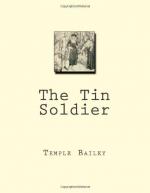He talked to them all. But beating like a wave against his consciousness was always the thought of Jean. Of the things he had to tell her which he could tell to no one else. He knew now that he could reveal to her the depths of his nature. He had withheld so much, fearing to crush her butterfly wings, but she was not a butterfly. They had been playing at cross purposes, and writing letters that merely skimmed the surface of their emotions. It had taken those moments in the Toy Shop to teach them their mistake.
Teddy, feeling that the occasion called for a relaxing of the children-should-be-seen-and-not-heard rule, asked questions.
“How long can you stay?”
“Ten days.”
“Are you going to Fwance?”
“I hope so.”
“Mother says I’ve got to pray for the Germans.”
“Teddy,” Margaret admonished.
“Well, I rather think I would,” Derry told him. “They need it.”
This was a new angle. “Shall you hate to kill them?”
There was a stir about the table. The old man and the women seemed to hang on Derry’s answer.
“Yes, I shall hate it. I hate all killing, but it’s got to be done.”
He spoke presently, at length, of what many men thought of war.
“We are red-blooded enough, we Americans, but I think we hate killing the other man rather more than we fear being killed. It’s sickening—bayonet practice. Killing at long range is different. The children of my generation were trained to tender-heartedness. We looked after the birds and rescued kittens, and were told that wars were impossible—long wars. But war is not impossible, and it has come upon us, and we are finding that men must be brave not merely in the face of losing their own lives, but in the face of taking the lives of—others. I sometimes wonder what it must have seemed to those Germans who went first into Belgium. Some of them must have been kind—some of them must have asked to be shot rather than be set at the work of butchery.
“I sometimes think,” he pursued, “that if we could give moving pictures of the war just as it is—in all its horror and hideousness—show the pictures in every little town in every country in the world, that war would stop at once. If the Germans could see themselves in those towns in Belgium—if the world could see them. If we could see men mowed down—wounded, close up, as our soldiers see them. If our people should be forced to look at those pictures, as the people of war-ridden countries have been forced to gaze upon realities, money would be provided and men provided in such amounts and numbers that those who began the war would be forced to end it on the terms the world would set for them.
“The fact that men are going into this war in spite of their aversion to killing shows the stuff of which they are made. It is like drowning kittens,” he smiled a little. “It has to be done or the world would be overrun by cats.”




